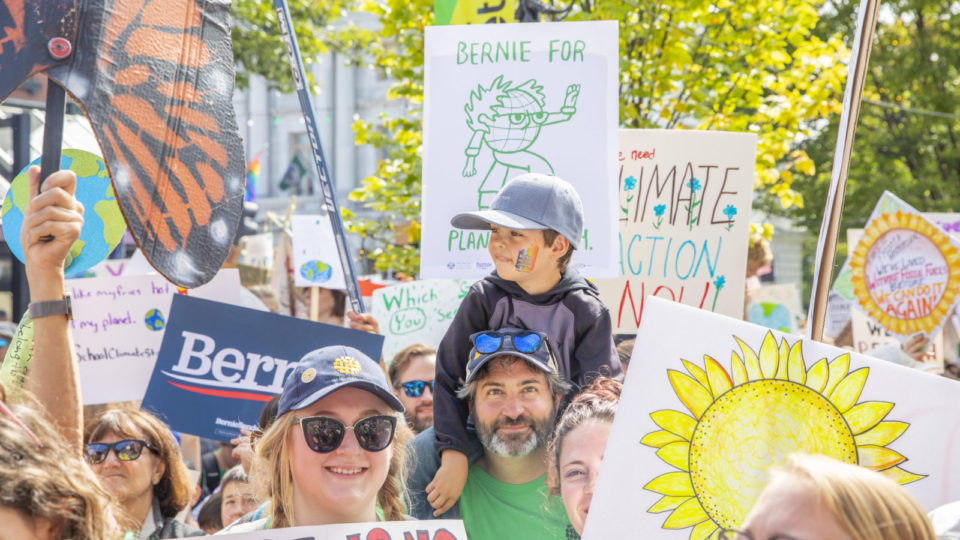Climate Action Week 2019 Recap
September 20 through September 27 was the first Global Climate Action Week. The week kicked off with the largest climate strike in world history, spearheaded by Swedish activist, Greta Thunberg, and carried by millions of students and activists in 185 countries. SunCommoners proudly stood among the ranks of the protesters in Rhinebeck, NY and Burlington, VT that day. We demonstrated, along with millions more citizens of the world, our desire for and commitment to bold, forward-thinking climate policy.
As we look back on the week of climate actions, we wanted to share some highlights that inspired us.
SunCommon’s Leadership is Committed to Action
Vermont’s global warming pollution has increased over the past decade, enabled by toothless pollution reduction goals rather than actual policy requirements. Vermont deserves action beyond rhetoric from our leadership.
8 states as well as Puerto Rico and DC have committed to 100% carbon free electricity. At least 13 other states are actively considering it. Vermont is not on that list. Clean electricity will be the foundation of our carbon free energy system, powering our cars and trucks, and heating our homes and businesses. Vermont should lead the way, not lag behind. Vermont could be powered by 100% carbon free electricity by 2030.
—James Moore, SunCommon Co-President and Founder
Millions of people, in cities across the globe, walked out to demand more action on climate change.
Has the world ever faced an issue matching the scale and stakes of climate change? Has there ever been a cause so unifying, that people of every nationality, ethnicity, and walks of life around the world feel it is incumbent upon them to take a stand?
As a mission-driven, market solution to climate change, we love to see this kind of mass mobilization!
Over 3,000 Businesses announced commitments to work towards carbon neutrality
This cohort includes Kering, a parent company of Gucci, Saint Laurent, Balenciaga, and other renowned fashion houses, and Schneider Electric, a global energy management company.
Food and dining service companies, Tesco and Sodexo teamed up with the World Bank to address food waste. The World Bank is committing over $1 billion in sustainable development bonds to combat food waste and loss. Tesco encouraged other grocery retailers to start quantifying their food waste, as they’ve been doing since 2013. And Sodexo pledged to prevent 50% of its current food waste by 2025.
Reducing food waste is one of the most impactful interventions in reducing greenhouse gases, because when food decomposes in landfills, it emits methane, which traps heat 30 times more effectively than carbon dioxide.
More notable commitments:
-
Amazon pledged to buy 100,000 electric delivery trucks from electric vehicle start-up Rivian.
-
The Bill and Melinda Gates Foundation, the World Bank and several governments — including the Netherlands, Switzerland and Germany — announced a $790 million commitment for assistance to over 300 million small-scale food producers who are facing more droughts, flooding and extreme weather because of climate change.
-
130 banks from 49 countries launched The Principles for Responsible Banking. Backed by the United Nations, the effort from one-third of the global banking sector, commits the banks to “strategically align their business with the goals of the Paris Agreement on Climate Change and the U.N. Sustainable Development Goals” in addition to “massively scale up their contribution to the achievement of both.”
-
IKEA, City of Milan, Italy, City of Ghent, Belgium, Harvard University, University of Pittsburgh, Memorial Sloan Kettering Cancer Center, Seattle Children’s Hospital, and the World Bank today announced they are joining the Cool Food Pledge, a budding movement to reduce the climate impacts of food—largely by addressing food waste and refrigeration. Cool Food commits signatories to collectively slash food-related greenhouse gas emissions by 25% by 2030, in line with limiting global warming to 1.5° Celsius.
